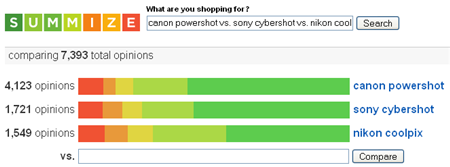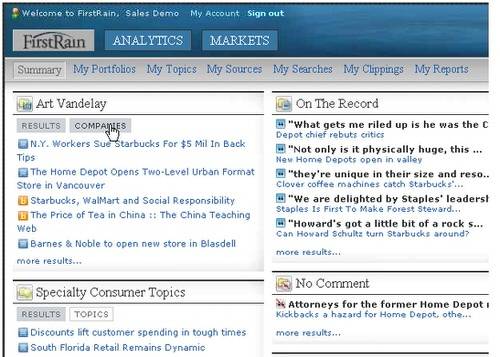Machines can do wonderful things. Side by side with the rise of a new world of publishers, the computer scientists of the world are cranking it up as well – building new ways to create value from the sea of data being published by people. And then they take their work and they sell it to advertisers!

Barf-o-rama!
We have some appreciation for advertising technology and we certainly appreciate our advertisers here at RWW – but why do so many innovative technologies end up slinking away into the ad tech world and watching their grand visions for user empowerment fade?
The most obvious answer to that question might be that advertising is where the money is made. Data mining, machine processing large quantities of information in order to unearth patterns or other valuable insights, seems just made for demographic and behavioral targeting by advertisers.
We argue here, however, that money can be and is being made from data mining in ways other than by by sale of information to ad networks. Cooler, more exciting ways. We briefly discuss four markets for mined data that we believe exist now or could hold strong demand for analysis of aggregate data from online activity.
Let’s be honest – we’re thinking about Twitter here. When people ask how Twitter is going to make money, we think data mining has huge potential. More than Twitter, though, all kinds of apps will soon trade in user data as a primary currency.
Here’s what we think that could look like.
Traffic
The most obvious example that’s already real is Internet Service Providers selling customer web traffic data to traffic analyst firms. When you see a company measures web traffic of sites around the web, you can be pretty sure they are buying data about what sites you are visiting from your ISP.
This isn’t the most interesting example because traffic analysis does find some of its meaning in advertising. It’s also used for competitive intelligence, identifying vertical leaders and generally adding some semi-verifiable sophistication to our understanding of the landscape of the web. Unfortunately, as any publisher online will tell you – the resulting traffic estimates from these services are often wildly inaccurate.
Sentiment Analysis
More interesting than simple comings and goings is sentiment analysis of language used online about a given topic. There are PR uses for this data, but there’s also a market for it in analyst firms who use it to make recommendations to their subscribers and clients.

Summize Labs have gone behind the cover of acquisition, but we believe that at least some of the original work continues.
This was the real technology being built by Summize, the search engine recently bought by Twitter. You might have noticed that though Summize is now called search.twitter – there’s still no link to it from the Twitter site. Perhaps search wasn’t the most important part of Summize after all – perhaps it’s the sentiment analysis that’s got the most potential.
Vertical Trend Watching
Ok, so maybe sentiment analysis of online activity could be solid enough to be interesting and worth a lot of money some day. And if wishes and buts were candy and nuts, we’d all have a merrier Christmas.
You know who’s not messing around when it comes to stuff like this, though? People who trade in money. Hedge fund buyers in particular are particularly willing to try out hard core technology in order to get more and better information faster than anyone else. They are nuts for crazy tech; they pay thousands of dollars for research tools that could wrap Google Reader up like a pretzel and swallow it in one bite.
FirstRain parses data you’d probably not think to imagine.

Check out our review of power news dashboard FirstRain, and RootMarkets a company that aims to trade in futures of web browsing data, ultimately for lead generation.
We want to see this kind of data crunching research tech outside of financial markets, though. We’d love to see some trends crunched out of the Twitter streams from Real estate pros, people in the Navy or biotech researchers. Users are segmented into these categories already by the directory Twellow, for example. We think rapid analysis of emerging trends in those verticals is something people would pay for.
Benchmarking
Google Analytics will now let you identify what kind of industry your website serves and once you do, they’ll tell you how your website traffic trends compare to what’s being seen by others in your industry. FreshBooks, a startup that provides online invoicing for independent professionals, offers benchmark data by industry to its users as well. Compared to other graphic designers, for example, you’re charging less and getting your invoices filled slower than most.
Benchmark data helps people and businesses make better decisions, hopefully saving or making more money than they would have otherwise. Isn’t that a lot more interesting than advertising?
Pointing out patterns of information gets people talking, too. Recommendation engine Strands offers a mobile banking service that prompts users to fill out their profile information by sharing interesting trivia with them about patterns in the data of users as a whole. “Did you know: married people spend 110% on groceries what single people do? Are you married or single?” Knowing whether customers are married or single lets a bank offer them targeted services, to understand the risks faced by their customers etc.
The Future of Data as Currency
These are just a few ways that large quantities of data can be used to derive value other than targeted advertising. All of them are more interesting than advertising, too.
Just like grocery stores give customers discounts in exchange for capturing their purchase histories, so too will users of online applications receive compensation for the data they co-produce with service providers that’s subsequently monetized.
Beyond money, user co-producers of data will likely call for the ability to take their data from one service over to another, where they can contribute it to another aggregate of data and thus participate in another instance of value creation through the processing of data. That’s data portability, or one way to articulate it.
We hope to see more examples of creative thinking about data mining and more startups that avoid taking the path of serving advertisers as their ultimate customers. The use of a tool impacts its orientation over time and these great technologies we are beginning to use online should be formed with greater goals in mind. There’s too much utility at stake and the world’s problems are too great for all this potential to be stunted by the seductive call of ad money. We hope an economy will grow to support alternative uses of user data and we hope it happens soon.
Top photo: Data processing center, CC from Flickr user Marcin Wichary









